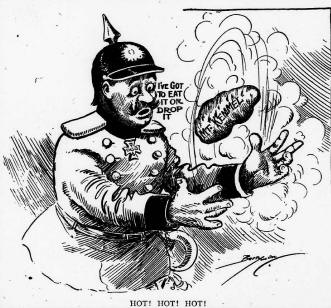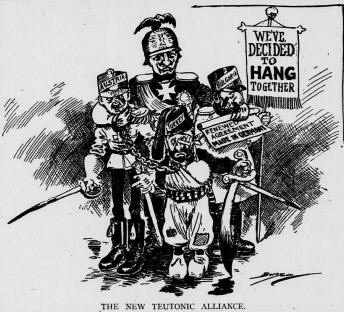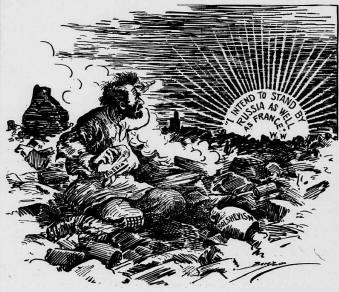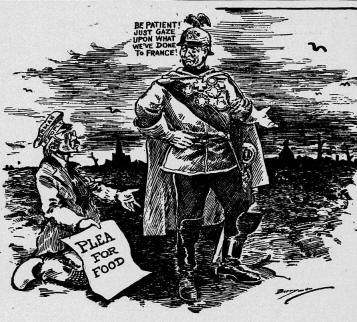May 1918
Food Shortages Led to Unrest in Germany & Austria
May 3
Allies Struggle To Prevent Collapse Of Belgian Line
 Military experts agree that before the Germans can go forward at the center of their present salient, west of Armentieres, it will be necessary to dispose of Allied troops and guns on the flanking hills to the north. While the region where the fighting is
taking place is mainly flat, the Kemmel high ground has become a thorn in the Germans’ side.
Military experts agree that before the Germans can go forward at the center of their present salient, west of Armentieres, it will be necessary to dispose of Allied troops and guns on the flanking hills to the north. While the region where the fighting is
taking place is mainly flat, the Kemmel high ground has become a thorn in the Germans’ side.
If the Germans were to take Kemmel, it would settle the fate of the remnant of the Ypres salient that still remains for the British after their retirement some days ago. To stay in Ypres, with all their rear communications dominated by the Germans, would be next to impossible. It would also invite a disaster in the form of
isolation and envelopment of the troops left in this region.
The Germans are driving salients, or wedges, into the Allied lines and then, when they can go forward no further in the salient, they turn and try to break down the sides from which flanking fire inhibits their main advance. If they are successful in this, as they seem to have been at Kemmel, then it will be necessary for the
Allies to consent to a retreat of their lines, and, in turn, the German salient will be ironed out and the whole affair will start over again.
This is an entirely different sort of operation from the attacks that were made in the first days of the present offensive. However, it may be merely preliminary to a new drive, a sort of clearing up of operations, finishing off one larger advance and preparing for a new one.
Any considerable progress of the Germans will put the whole Belgian army to the north in jeopardy of being surrounded. With each thrust, the Germans draw nearer and nearer to the sea, and the gap between the sea and the front lines, through which the Belgians must retire to avoid isolation, is narrowing. It is absolutely
essential that there be a retreat before this becomes too narrow. It is plain from the map that an advance of not more than ten miles would compel a retreat of the whole Belgian army from the fragment of their country still left to them.
Offensive Claims Over Million Men
British losses in men killed, wounded, captured and missing on the Western front since the German offensive began on March 21st are estimated at nearly 250,000. Estimates of Allied observers have placed the loss of Germans at a staggering figure of close to one million men. From the very nature of the fighting, military
experts have pointed out that the losses of the attackers were bound to be heavier than those of the defenders. In addition to that, however, the method of German attack, advancing troops in waves faster than machine guns could mow them down, entails enormous losses.
An inkling of how serious the German losses were came some time ago when it was reported that the German military dared not disclose them to the German people, and, therefore, were sending the wounded to Belgium. Other reports have told of railways being choked with trains of wounded. All the dispatches of correspondence at
the front have told how the battlefields were carpeted with gray-clad bodies.
May 10
Austria Spirals To Crisis
 A critical economic and political situation is developing in Austria-Hungary. The Empire has been deep in difficulties, both political and economic, for more than a year, and it has been an open secret that Emperor Charles was desirous of bringing
about peace. His efforts in this direction, however, have aroused criticism in Berlin.
A critical economic and political situation is developing in Austria-Hungary. The Empire has been deep in difficulties, both political and economic, for more than a year, and it has been an open secret that Emperor Charles was desirous of bringing
about peace. His efforts in this direction, however, have aroused criticism in Berlin.
In the last three months there have been increasing reports that the food situation in Austria was growing desperate. Except for the favored classes, the people are receiving barely enough food to avert actual starvation.
The difficulties in the way of securing sufficient food for the population have created a critical situation throughout the Empire. Famine during the winter was said to have been prevented only by the arrival of 50,000 carloads a grain from Romania. However, even this was insufficient, causing food riots in Prague. The
separate peace with Ukraine failed to relieve the situation on account of the difficulties of transportation.
Unrest in the Slovenia district of Austria is growing daily and mutiny is spreading with great rapidity. Slovenian Deputies are demanding a separation from Austria and urge the Slovenians to free themselves forcibly from the Germans.
The main problem with the Austrian Empire is that it is made up of a large number of different nationalities including Russians, Lithuanians, Ukrainians, Poles, Romanians, Czechs and Hungarians, which regard each other like hungry wolves regard their prey.
The Czechs are unified in supporting a Czech Republic and their ambition in separating from Austria. Even the southern Slavs are openly taking a front against the Habsburgs, while the Poles are starving for union with the Congress of Poland.
Hungary, which has plenty to eat, boycotts Austria, which is starving. Almost nothing is coming from the Ukrainians because the Bolsheviks burned everything on their retreat, and what does arrive goes to Bohemia to help calm the flames of insurrection in Germany.
Allies Ignore Bolshevik Demands To Cease Helping Rebels
 Bolshevik demands that the Allies cease their activities at Vladivostok have brought no official statements from the Allies. The Bolsheviks accuse the Allies of participation in a Siberian counter-revolt plot.
Bolshevik demands that the Allies cease their activities at Vladivostok have brought no official statements from the Allies. The Bolsheviks accuse the Allies of participation in a Siberian counter-revolt plot.
It is believed that the Soviet government is aiming at the withdrawal of the Japanese and British troops who have landed at the Siberian seaport and are taking over the large store of military supplies there, which they believe they will then give to the Siberian anti-Bolshevik rebels.
Apparently, the Russian elements in Siberia that oppose the Bolsheviks found it impossible to make headway in organization without a supply of munitions and asked assistance from the Allies. The opposition elements approached the foreign consuls at Vladivostok, but were informed they could not act in such a matter. It is
understood that the Siberian agents found that if they were to have any help at all it must come in the form of gaining access to the munitions at Vladivostok, which the Allies now control.
May 17
German Dog Defects To Doughboys
Americans participated in the successful French assault in the Aspremont forest. Slightly to the east of the section raided, American patrols created a diversion. One patrol entered Aspremont village, which was found deserted. This provoked a German barrage while the men were returning.
Another patrol cut the enemy’s first system of barbwire and was engaged on the second entanglement, ten-yards from the trenches, when fifteen Germans, using rifles, bombs and pistols, attacked it. The Americans fought for fifteen minutes before retiring, without suffering casualties, on the approach of the enemy’s
reinforcements.
The Americans did, however, capture a German trench dog. The American troops adopted the dog, naming him ‘Fritz.’ Each soldier gave a portion of their rations to their new canine ally and said he ate as if starved. Fritz, when offered the opportunity to return to his own lines, refused to leave the American trench, whereupon
he was ‘officially enlisted’ into the American Army.
Allies Await Renewal Of German Offensive
Another week has passed without a renewal by the Germans of their offensive. A new effort by the enemy has been looked for almost every day, but no effort has been made to start one so far. Possibly the Germans have been waiting for some Allied counter-blow, which they felt able to withstand, and therefore, hoped would be
dealt.
If this was the case they must have been disappointed by the waiting attitude of General Foch, which will now compel the enemy to reveal his further purpose with little delay. With the American forces now rapidly swelling to formidable numbers, time is not something he can afford to squander.
If, as it is considered certain, the Germans have employed such time as they have to build up the machinery for a new attack on probably an even greater scale than before, it is equally sure that the Allied armies under unified command have not neglected to employ the interval in making every preparation possible to meet the
German blow.
German Submarine Campaign Sinking Fast
The effectiveness of the German submarine campaign is declining. The number of German submarines sunk hit an all-time high in April, May and June of 1917 when 600,000 tons of shipping were sunk. In July it declined, and by November it fell below 400,000 tons, and has diminished continuously since then.
On the other hand, the number of submarines destroyed has increased progressively since January in such proportion that the effectiveness of enemy squadrons cannot be maintained. The number of U-boats destroyed this year was far greater in each month than the number constructed in the same month. Meanwhile, new allied merchant
ships are being launched faster than they are sunk.
The decrease in the number of submarines has a decided effect on German morale. Every submarine sent to the bottom carries with it a trained crew, which is becoming increasingly harder to replace.
The most conclusive evidence we have seen of the failure of the enemy submarine campaign is the huge American Army in France and the hundreds of thousands of tons of stores brought across the Atlantic. These troops and munitions of war stand as irrefutable proof of the protective powers of the British and American Navies.
May 18
Allies Block German Far East Ambitions
Japan and China have been informed by the Allied governments that they have arranged for Allied military cooperation to meet the dangers threatening the peace of the Far East from German penetration.
Japan, under treaty with England, felt itself chargeable with maintaining the security of the Far East. When German influence first began to manifest itself in Siberia the Japanese government put plans in place for a military occupation of portions of Siberia, as far west as the Ural mountains.
The Allies feared that Japan’s invasion of Siberia on the Russian people would be misunderstood, and that the Japanese occupation would throw Russia into the arms of Germany. Therefore, Tokyo’s project was postponed.
Meanwhile, consideration is being given to how to best aid the Russian people to repel further German aggressions and penetrations into Russia in violation of the Breast-Litovsk treaty. The Allied powers have been giving much attention to the possibility of a military demonstration in the north of Russia, where a new
expeditionary force in the shape of British and French soldiers landed at Kola, and occupied this Russian territory to prevent the Germans from occupying it.
The success of such an enterprise, however, will depend upon the attitude of the Russian government and it will be undertaken only if a majority of the Russian people wish it.
Desire For Unity Evident In Russia
Fragmentary reports and dispatches are giving the impression that leaders of Russia, working in Allied countries, are casting about for ways to restore the unity of Russia. Rumors center on Russian military men who are still loyal to the Kerensky government, of which the Russian Ambassador to Washington and his staff are still
accredited diplomatic representatives, departing from the United States..
Kerensky’s recovery from a prolonged illness and his trip to Siberia are considered especially significant. The reason for Kerensky’s trip to Siberia is probably that he saw the best chances there to form a new national government. One advantage of this plan, it is argued, would be to capitalize on the strong anti-German and
thoroughly Russian sentiment in Siberia. Some Russian leaders in this country openly advocate the idea that Russia’s rehabilitation may be brought about through Siberia. The plan, they propose, is to set up a strong government there, with Allied cooperation, and thus lay the steps for assistance of the Allies. By doing so, this will avoid any
suggestion that the Allied forces invaded Russia, but suggest instead that they came at the invitation of a new Russian government inside Siberia.
Food Situation In Germany Worsens
 The food situation in Germany is the most critical it has been so far. Even with the reduced ration plan now in effect, the country will not have enough food to carry the population through to the next harvest, and further reductions will have to be
made.
The food situation in Germany is the most critical it has been so far. Even with the reduced ration plan now in effect, the country will not have enough food to carry the population through to the next harvest, and further reductions will have to be
made.
It was hoped that grain would be forthcoming in large quantities from the Ukraine. When this hope vanished, the German government saw that the reduction must be made. Germany began consuming her 1917 wheat crop two months before they intended to start on it. The German potato crop has not turned out nearly as well as German
interests had hoped.
Announcements that bread rations are to be reduced have caused grave apprehension throughout Germany. Socialist German newspapers speak of the surprise which the German people will feel when they realize that they must suffer more depravities while they were counting on an improvement of the food situation based on what has
been said about supplies of wheat coming from the recently conquered Ukraine and Romania.
Even more critical than the German food situation is that of Austria’s food crisis. The food supplies are only sufficient enough to feed Hungary and the Army, and Austria could expect nothing but its own harvest.
It is reported that Germans are living for weeks almost entirely on mushrooms gathered in the forest outside the towns in which they live. People often faint in the streets from hunger. The health of many is such that they could hardly stand, to say nothing of work, and things are getting worse every day. Even the soldiers do
not have sufficient food. They are not only sick of war but also thoroughly apathetic regarding it. It is a common sight to see soldiers begging for food.
The worst three months - June, July, and August - are yet to come. Last year there was almost nothing to eat in those months but cucumbers and fruit. Typhus and dysentery became epidemic. The people fear the prospects of these three months now.
Unrest Grows In Austria-Hungary
Martial law has been proclaimed in Bohemia. Outbreaks have occurred in many towns in the Kingdom. Accounts of great gatherings where the population demanded food and the end to the war forced the Austrian government to declare martial law. Prague was adorned with the Czech colors and the Slav tri-color flag.
Meanwhile, protests are growing across the Austrian-Hungarian Empire against the deepening of the alliance between Austria and Germany. The alliance is seen in Hungary as an obstacle to Hungary’s aspirations for political and economic independence.
May 31
Germans Renew Offensive On Western Front
On Monday, Germany resumed her drive for a decision on the Western front after a lapse of nearly four weeks, striking in the north between Rheims and Soissons and in Flanders, or the northerly side of the Lys salient
While it is too early for the true German intention to be disclosed, the effort apparently is simultaneously to push through to the Channel ports in the north, thus breaking up the British front, and to strike for Paris in the south, an effort aimed mainly at the French.
The southerly blow, which covers the front of some 40 miles and apparently is by far the more important of the two, has come at a point that had not been considered the most probable field for the renewal of the German attempts. The fact that both British and French troops are found holding this front, however, gives
indication that General Foch, the allied Commander-In-Chief, has hardly been caught napping and has large forces massed there.
The stroke in Flanders, while of far less magnitude, covering the front of less than 10 miles, is nevertheless aimed at points which the Germans must take before they can hope to carry their April advance further towards the coast.
The Germans, striking south in the opening of their new offensive, have pushed on rapidly and affected a crossing of the Aisne River. This represents a front nearly 20 miles long. The battle is continuing fiercely, the brunt of it being borne by the French, before whose lines there was seemingly the greatest concentration for
the enemy effort.
There is no indication that the British right flank was materially affected by the shock. The left flank, however, felt the effect of the impact upon the French front further west, where crossing of the Aisne was forced, and the British left was obliged to fall back in conformity.
Although there was an extremely heavy concentration of troops for the limited front attack, the German attack in Flanders was evidently a secondary affair, not even on the scale of some of the previous offensive movements there.
Army officers here see a political, as well as a military purpose in the unexpected direction of the German drive between Soisson and Rheims. Their theory is that the Germans are aware of the great advantage to the Allies through the broad powers bestowed upon General Foch. The reason for choice of locale of their present
effort is interpreted as an assault upon this unified command.
The German movement, it was explained, is probably a test of this unity of command, and the Germans seek to compel the British to rush to the aid of the French, as the French went to the aid of the British when the Channel ports were threatened.
The chief advantage of the Germans, in their swift advances of the last few days, is said not to be so much in the capture of territory or even the prisoners, but in the strain their strategy puts upon the army of reserves.
If the British and French must dispatch large numbers of reservists to the region of the present activity, it means that they must be withdrawn from Amiens and from the stronger defenses built up for the Channel ports. To get them back again means a considerable detour behind the semicircular line, which the Germans have
marked by their penetrations.
In other words, the Allies must defend two far-distance points, and assure the safety of the long distances between them. By placing before them this problem, the Germans hope to avoid a significant concentration of troops for a heavy counterattack.
Russia Still Big Factor In War
Every day the Germans are providing fresh fuel for the fire of German hatred which is burning as red as the revolutionary flags that wave over the Russian Embassy in Berlin. The German action in the Ukraine, while pleasing to a few, is setting many violently against them.
Polish legionnaires and Germans have fought a pitched battle with 75,000 on each side. All this tends to increase the number of forces needed by the Germans in the East. The Allies should realize that the revolution keeps many German troops employed here.
From all parts of the occupied territory come fresh tales of the resentment against Germans’ strictness and greed. Here is a small thing, but it will illustrate the way in which the Germans exasperate the peasantry: it is the general registration of hens. Every hen has to produce three eggs weekly. Any hen that does not must
be brought in person to satisfy the Germans that it can still lay eggs. Hens that are no longer able to lay eggs must be given to the Germans where they are then butchered for their meat.
There are thousands of similar stories, and everyday peasant risings here, and they are causing a perpetual conflict not only between the Germans and the peasants, but also between the Germans and the classes they appointed to rule the states they now occupy.
There are two marked tendencies in Eastern Europe. The masses are becoming more definitively anti-German, while the privileged classes are looking more eagerly to Germany to save them from the masses.
Read past editions of News Reports From the Front
Have a newspaper clipping on a event that took place in Emmitsburg?
If so, send it to us at history@emmitsburg.net